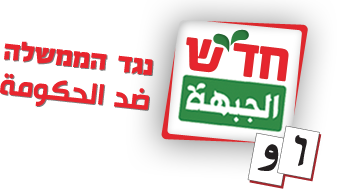Hadash – Democratic Front for Peace and Equality
Hadash – our story
Hadash – (the Democratic Front for Peace and Equality) was established in 1977. The aim of its founders was simple: to bring the main protest movements of that period – the Land Day Protest and the Black Panthers Protest into the Knesset. The basic principles of the new movement were also simple: peace, workers' rights, social justice, democracy, equality for the Arab minority, ethnic equality, equality for women and the protection of the environment.
Hadash, which was established as a frontal organization of the Israeli Communist Party (Maki), was established around simple ideas, but has become one of the most intricate and fascinating political movements in the history of Israel. The reason for this is clear: Hadash has always swum against the mainstream.
Against the Mainstream
To be a consistent left wing movement in Israel means to swim again the mainstream. Hadash was, in all its years of existence, a haven of Jewish-Arab cooperation in an existence of segregation and discrimination. It was (and still is) a socialist movement in a capitalist state, a movement which supports women's rights in a patriarchal society, a peace movement in a reality of occupation and wars, a movement of environmental justice in a region which is gradually taken over by polluters and real-estate sharks.
Hadash was the first to use the slogan "two states for two peoples", the first to say that privatization will cause an increase in poverty and inequality, the first to stand against unnecessary wars, even on their very first day.
A History of a Struggle
When reading the historical speeches of the Hadash Knesset members, one realizes how consistent and principled their stand was during all these years. Tuffik Toubi, one of the founders of Hadash, was one of the first to attack the privatization policy, when it was still at its very beginning: "There is today talk also about the privatization of the Post office, the phones, electricity, the trains etc. etc. This policy entails, on the one hand, damage to the national state interests. Entrusting these vital services into private hands subordinates them to the profit interest and the amassing of benefits for the new owners, at the expense of the economic-political interests and the benefits of the workers. At the same time, by taking these steps, the government's policy aims at jeopardizing the rights of the workers and their achievements." (Speech at the Knesset, 1.12.1982)
His factio co-member, Meir Wilner, said about the first Lebanon war three days after it broke out: "It is said that the war was started by Israel in order to remove the artillery to a distance of 40 kms. What are 40 kms? Tomorrow there will be artillery with a range of 60 kms and 100 kms. This is an argument fit for a kindergarten! There is no other solution but a political one. According to your logic one will have tomorrow to conquer Beyruth and perhaps Damascus too, and who knows to what extremes your militaristic madness can go?" (Speech at the Knesset,8.6.1982).
Achievements
A struggle against the system is long and difficult, but in spite of this, Hadash succeeded in attaining enormous achievements, and to become on of the most effective political movements in Israel. At the Knesset, Hadash achieved historical victories, such as the law forbidding firing workers who establish a labor union and are active in it, a law that extends the equal opportunities in workplacesstatute also on labor contractingagencies, a law guaranteeing the rights of tenants in public housing, the law for rehabilitation of mentally handicapped persons in the community, and many other laws which promote social and environmental justice and human rights.
All through the years, Hadash was first and foremost a movement that works both in the Knesset and in the community. The Hadash faction in the national workers' union, the Histadrut, succeeded after years of struggle to bring about democratic elections at the workers' councils in Arab settlements, and to make Arabic one of the official languages of the Histadrut. Furthermore, Hadash supported numerous workers' struggles that gained important achievements, such as the direct employment of workers in various municipalities.
Hadash-students led struggles within campuses all over the country and brought about important achievements such as the emphasis on the Arabic language in universities, and the recognition of religious non-Jewish holidays. Hadash-students is an activist movement which held, over the course of the years, countless mass events against the occupation, violence against women and the exploitation of contract workers.
The feminist activiy in Hadash, including the activity of the Hadash faction in Na'amat and the activity of Tandy (Women's democratic Israeli movement) acts against the discrimination of women in the workplace, against violence in the family, and promoting the alliance of Jewish and Arab women for Peace.
As before, so Today
To be "against the system" is a lifelong project. Even today, Hadash continues to struggle in an atmosphere of inequality to promote social justice, peace and Jewish-Arab cooperation. Hadash representatives in the workers' union promote the struggles of the weakest workers. Hadash representatives in Na'amat accompany the struggles of women who have been dismissed from their jobs because they went on maternity leave. Hadash student activists led the campus protest against the war in Gaza.
Joining Hadash means joining a long, challenging, and exciting journey against the system. To be part of a socialist movement without donations from the wealthy, and with a great number of volunteers who believe that the country we are living in could be a much better place.





